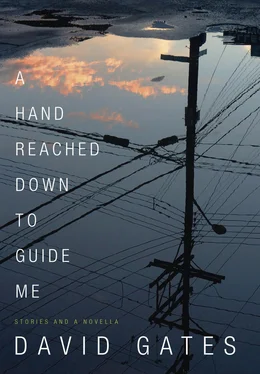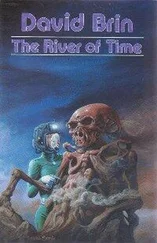David Gates - A Hand Reached Down to Guide Me
Здесь есть возможность читать онлайн «David Gates - A Hand Reached Down to Guide Me» весь текст электронной книги совершенно бесплатно (целиком полную версию без сокращений). В некоторых случаях можно слушать аудио, скачать через торрент в формате fb2 и присутствует краткое содержание. Жанр: Современная проза, на английском языке. Описание произведения, (предисловие) а так же отзывы посетителей доступны на портале библиотеки ЛибКат.
- Название:A Hand Reached Down to Guide Me
- Автор:
- Жанр:
- Год:неизвестен
- ISBN:нет данных
- Рейтинг книги:5 / 5. Голосов: 1
-
Избранное:Добавить в избранное
- Отзывы:
-
Ваша оценка:
- 100
- 1
- 2
- 3
- 4
- 5
A Hand Reached Down to Guide Me: краткое содержание, описание и аннотация
Предлагаем к чтению аннотацию, описание, краткое содержание или предисловие (зависит от того, что написал сам автор книги «A Hand Reached Down to Guide Me»). Если вы не нашли необходимую информацию о книге — напишите в комментариях, мы постараемся отыскать её.
magazine anointed “a true heir to both Raymond Carver and John Cheever.”
A Hand Reached Down to Guide Me Relentlessly inventive, alternately hilarious and tragic, always moving, this book proves yet again that Gates is one of our most talented, witty and emotionally intelligent writers.
A Hand Reached Down to Guide Me — читать онлайн бесплатно полную книгу (весь текст) целиком
Ниже представлен текст книги, разбитый по страницам. Система сохранения места последней прочитанной страницы, позволяет с удобством читать онлайн бесплатно книгу «A Hand Reached Down to Guide Me», без необходимости каждый раз заново искать на чём Вы остановились. Поставьте закладку, и сможете в любой момент перейти на страницу, на которой закончили чтение.
Интервал:
Закладка:
—
Back upstate, he arranged to rent the main house to Karen Friedman, a neurology resident who’d been his most promising student two years—no, three years—earlier, and her partner, as the expression went, a dumpy older woman named Gloria, who managed the Staples store at the mall out on the bypass. He put the Volvo away in the barn and covered it with a blue plastic tarpaulin. (Martine used to say the car made her feel like a “doctor’s-wife impersonator,” which was why she’d picked it out.) He drove his Jeep up the hill behind the house to the cabin that he and Nathan had built the summer Nathan turned sixteen: their last father-son project. A couple of years ago, a contractor had installed a woodstove and a composting privy. Electricity came through a series of hundred-foot orange cords, the first plugged into the outlet down on the back porch, the last connected to a power strip for the computer, coffeemaker, microwave, mini-fridge and a combination radio/compact-disc player. The cabin had served as a guesthouse and a—what term wouldn’t be pretentious?—a place to do his taxes. He stacked split cordwood between the trees around the cabin, making a meandering wall with a gap by the front door. On a tree along the steep path down to the house, he hung a clapperless bell and a large eyebolt so visitors could give warning.
Jimmy Huggins, whose office had been across the hall from his, took over the reconstruction of his mouth. The choice was between implants (now the “gold standard,” Jimmy said) and bridges, which would involve grinding down undamaged teeth on either side of the extractions. In the meantime, since they knew him at the family-owned pharmacy on University Avenue, he phoned in a Percodan prescription to the Rite Aid in the mall, using the name Kaspar Hauser.
He had brought a single carton of books up from his library: Anthony Powell, Simenon (to see if he could get his French back), Patrick O’Brian, the Oxford Shakespeare. He hadn’t read Shakespeare since Princeton—half a century ago—and how could you stand before God without having tasted the best His world had to offer? (He now allowed himself God thoughts: intellectual integrity was no longer worth the vigilance.) Sitting in the Morris chair, he worked through Lear again, but Othello turned out to be a bit close to home.
He filled gallon plastic jugs, ten at a time, at the kitchen sink and carried them up in the Jeep. He had a blue enameled basin, a handsome thing Martine had bought, for doing dishes, rinsing with mouthwash (brushing was still uncomfortable), shaving and washing above the waist. Saturday night was bath night, as in his childhood; after the girls went into town, for a movie or for dinner with whoever their friends were, he walked down to the house, filled the claw-foot tub that Martine had restored and poured in their perfumed bath salts. If they knew, so be it: he was turning into a strange old man. Percodan was no longer doing the trick, so Kaspar Hauser had been put on Dilaudid. He moved his bowels in the privy—because of the drugs, he supposed, he’d had to resort to laxatives—but pissed on the ground, like Adam. Sometimes he would unplug the power strip, fling the end of the orange cord out the window and let the cabin float free.
He had given thought to the possibility of AIDS and decided that it was unlikely. His mouth had been bloodied only afterward, but he had swallowed the boy’s semen, not knowing what else to do and not wanting to seem, well, unaccepting. So he drew a sample from his arm and sent it to the lab. The negative result, of course, meant nothing: he would have to take another sample in six months or so. He made a note on the December 31 page of his appointment book: Draw blood .
One Saturday night, early in the fall, he went upstairs after his bath, the towel around his waist, smelling of roses and remote on Dilaudid, his old man’s dugs swinging. In the master bedroom, he took a pair of Gloria’s black lace underwear from the top drawer of what had been his dresser. They were so large that the scalloped rim slipped down to his buttocks. He tried to imagine himself inhabiting the bulky, penis-free body that would fill them up—“panties” was the word—but couldn’t quite cross over. He lay down on the bed and turned on his side. He’d got so lanky that his knees banged together. He put a pillow between them and reached into the panties to handle himself, to make his disgrace definitive, but the poor thing was dead and perhaps this made his disgrace definitive. The curtains were open, the shades up, and he saw the leaves of the maple tree suddenly brighten to orange. Headlights: the girls coming home. He would let himself be caught, and that disgrace would set him free. But it was only someone passing by.
—
His first wife had been a nurse: this was back when such arrangements were countenanced. Wide hips, full breasts, a fondness for musicals and Dave Brubeck. She thought he looked like Brubeck, and in those days, before Martine had urged laser eye surgery on him, he might well have. Angela had had a bad habit (he’d never called it to her attention) of prefacing statements with “Truth to tell.” He could no longer remember what they’d talked about, late in the night. She had stopped working when she began to show and stayed home to raise Nathan, then Claudia. Another age of the world. And, years later, the younger woman, the son hanging up the phone, the weeping daughter telling him she would never have a family. How could all this—“tedium” was the word for it—have given any of them either pain or joy?
He had saved lives. At first he’d tried to keep count—could he ever have been that young?—but these were lives that any doctor could have saved. Once, when he was still in practice, he was on emergency-room duty and they brought in a teenage girl: some fool woman, a hairdresser of all things, had thought she knew how to perform an abortion—it was that long ago—and afterward he had put the girl on the Pill. Half a year later she came to him in his office, pregnant again; insanely, he had given in, risking not just the loss of his license but, in those days, a charge of murder. When the girl came to him one more time, he turned her away, and that same night—or so he’d taken to telling the story; it was really the following night—she died in the ER, of an overdose of Nembutal. Well, any doctor of his generation had such stories. She was a homely, overweight girl named Cheryl—Robinson, she had told him, but it was actually something else—with pimples on her forehead. She smelled. He had looked into it a little afterward; he had been that young. The parents were divorced; the mother had a boyfriend and what was then called a drinking problem, and she’d taken out an order of protection against the father. All three, apparently, had beaten the girl. Cheryl Robinson had been sixteen, ten years older than Claudia. And now Claudia was old enough to be Cheryl Robinson’s mother. Although she had chosen to be no one’s mother.
The night after the girl died, he had told Angela that he’d had enough of practice and meant to teach full-time. And he suggested that they adopt a child. “This is a turnaround,” she said, and poured herself more wine. “So why did I get my tubes tied?” The next day—and it really was the next day—he made a date to get together with the receptionist who’d been flirting with him. Since she, too, was married, there would be no complications.
Martine had been his sixth adventure, if that was the word: of this he had kept count. He’d been seated next to her at a dinner party after she’d arrived at the university as the new specialist in the Victorians. Did she not find them a little stodgy? “Everybody thinks that,” she’d said. “The Victorians were hot hot hot. Of course, it was all encoded. You should come in when I teach ‘Dover Beach.’ ”
Читать дальшеИнтервал:
Закладка:
Похожие книги на «A Hand Reached Down to Guide Me»
Представляем Вашему вниманию похожие книги на «A Hand Reached Down to Guide Me» списком для выбора. Мы отобрали схожую по названию и смыслу литературу в надежде предоставить читателям больше вариантов отыскать новые, интересные, ещё непрочитанные произведения.
Обсуждение, отзывы о книге «A Hand Reached Down to Guide Me» и просто собственные мнения читателей. Оставьте ваши комментарии, напишите, что Вы думаете о произведении, его смысле или главных героях. Укажите что конкретно понравилось, а что нет, и почему Вы так считаете.











